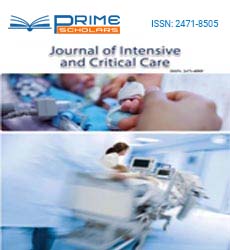Commentary - (2023) Volume 9, Issue 5
Point-of-care Ultrasound Examination in Emergency and Intensive Care of Exotic Animals
Lisa Hirt*
Department of Neurosurgery, University of Colorado School of Medicine, USA
*Correspondence:
Lisa Hirt,
Department of Neurosurgery, University of Colorado School of Medicine,
USA,
Email:
Received: 02-Oct-2023, Manuscript No. IPJICC-23-18290;
Editor assigned: 04-Oct-2023, Pre QC No. IPJICC-23-18290 (PQ);
Reviewed: 18-Oct-2023, QC No. IPJICC-23-18290;
Revised: 23-Oct-2023, Manuscript No. IPJICC-23-18290 (R);
Published:
30-Oct-2023, DOI: 10.35248/2471-8505-9.5.46
Description
In times of medical emergencies, the swift and proficient provision
of critical care can make the difference between life and
death. Emergency Critical Care (ECC) plays a pivotal role in the
healthcare system by providing specialized treatment to patients
who are in critical conditions. This article explores the
numerous benefits of ECC and its indispensable role in saving
lives and improving patient outcomes. One of the primary benefits
of ECC is the prompt intervention it offers during medical
emergencies. The critical care team is equipped to respond
quickly to patients facing life-threatening conditions, ensuring
that crucial minutes are not wasted. Rapid response can
be the key to preventing further deterioration and improving
the chances of survival. ECC is administered by a highly skilled
team of healthcare professionals, including critical care nurses,
physicians, respiratory therapists, and other specialists. These
professionals have specific training and experience in handling
critical cases, allowing them to provide the best care possible.
Their expertise is essential in diagnosing and managing complex
conditions. Patients in critical condition require continuous
monitoring to ensure their stability and progress. ECC units are
equipped with advanced monitoring devices that keep track of
vital signs, oxygen levels, cardiac activity, and more. This continuous
oversight allows for immediate adjustments to treatment
plans when necessary, ensuring that patients receive the
most appropriate care. Emergency Critical Care is not a onesize-
fits-all approach. It offers individualized treatment plans
based on the patient’s specific needs and condition. The ability
to adapt treatment in real-time is a significant advantage, as
each patient may require different interventions, medications,
or procedures. ECC units are equipped with cutting-edge medical
technology and equipment, including ventilators, defibrillators,
ECMO machines, and advanced imaging devices. These
tools are vital for managing severe cases, such as heart attacks,
respiratory distress, trauma, and more. The availability of such
equipment can be the difference between life and death. Emergency
Critical Care takes a multidisciplinary approach, where
various specialists collaborate to provide comprehensive care.
This approach ensures that patients receive treatment from
experts in various fields, contributing to better outcomes. The
teamwork and communication within the ECC unit are critical
to delivering effective care. Emergencies can occur at any time
of day or night. ECC units are operational 24/7, ensuring that
patients can access critical care whenever they need it. This
round-the-clock availability is crucial for managing unexpected
medical crises promptly. Perhaps one of the most significant
benefits of ECC is its role in reducing mortality rates. Patients
admitted to ECC units have a higher chance of survival compared
to those who do not receive critical care. The immediate
response, expertise, and advanced resources available in
ECC units are factors that contribute to this life-saving impact.
ECC does not only save lives; it also enhances the quality of life
for survivors. Patients who receive timely and effective critical
care are more likely to recover with fewer complications. This
leads to better long-term outcomes and a higher quality of life
post-treatment. The recovery process for critically ill patients
can be challenging, but ECC helps expedite this journey. With
early intervention and specialized care, patients often recover
more quickly, spending less time in the hospital.
Acknowledgement
None.
Conflict Of Interest
The authors declare no conflict of interest.
Citation: Hirt L (2023) Point-of-care Ultrasound Examination in Emergency and Intensive Care of Exotic Animals. J Intensive Crit Care. 9:46.
Copyright: © 2023 Hirt L. This is an open-access article distributed under the terms of the Creative Commons Attribution License, which permits unrestricted use, distribution, and reproduction in any medium, provided the original author and source are credited.

